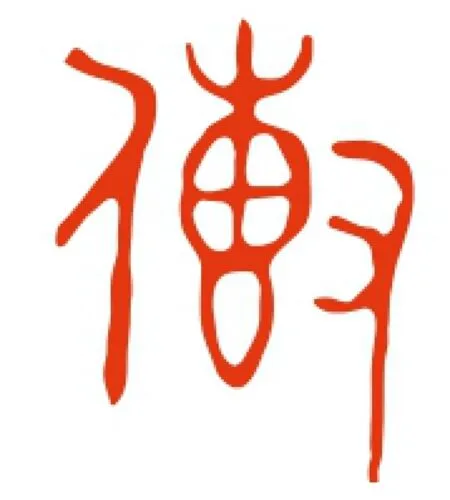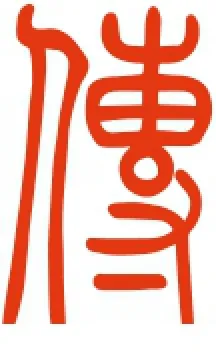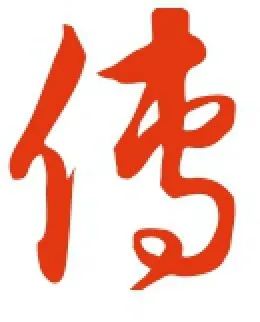ON THE CHARACTER
2017-07-05
ON THE CHARACTER
Whether you’re spreading rumors or legends, you need 传
古往今来多少事,一部青史一传说
it’s said that a legend is simply a rumor with stamina.
Immersed in the mundane details of the everyday,
people need a virtual, magical word for sweet respite.
An imaginary universe, heroic characters, magic, and exciting adventures—there’s no limit to the wizardry of escapism. In Chinese, the word for legend is 传奇 (chuánq!), with 奇 (q!) meaning “strange, unusual, or extraordinary,”but it’s with the passage, or 传 (chuán), of these legends thatwe shall concern ourselves.

Bronze ScripT

Seal ScripT

clerical ScripT

curSiVe ScripT

regular ScripT
The traditional version of 传 is, which was originally a noun, pronounced as zhuàn, referring to postal carriages in ancient times. It is a pictophonetic character, with the “people” radical “亻” indicating the meaning, the postman, whileserves as the pronunciation guide.
Gradually, this term was extended to serve as a verb, meaning to hand something from one person to another, or from one generation to the next. This leads to the term 祖传秘方(zǔchuán mìfāng), a secret prescription handed down from an early ancestor of the family; or传经送宝 (chuánjīng sòngbǎo), to pass on one’s valuable experience. on a sports team, there is the term 传帮带 (chuán bāng dài), which consists of three one-character verbs: pass, help, and lead, which refers to the tradition of veterans helping rookies. The idiom 传宗接代 (chuánzōng jiēdài) means to have a son to carry on one’s family name.
Passing or handing down information with the character 传 can be broader; for this meaning, we have the word 传播 (chuánbō, spread, publicize, disseminate). For example,传播谣言 (chuánbō yáoyán) is “to spread rumors,” while rumor itself can be translated into 传言 (chuányán). It is said that bad news has wings, and Chinese has a similar proverb:“好事不出门,坏事传千里。(hǎoshì bù chūmén, huàishì chuán qiānlǐ. Good news never goes beyond the gate; while bad news spreads far and wide.)”
传 can also mean “express” or “convey.”Language isn’t the only way one might express oneself. Lovers convey their feelings through eye contact, which is called 眉目传情 (méimù chuán q!ng, flash amorous glances); vivid imagery in writing and painting can also express strong emotions, so it is called 传神之笔 (chuánshén zhī bǐ, pen that conveys spirit). If something is too subtle or profound to be conveyed, you can say 其中奥妙,不可言传。(Q!zhōng àomiào, bùkě yánchuán. What lies within defies all description.)
In modern Chinese, we have the word 传染 (chuánrǎn, infect, be contagious). It can be used for disease, as in, 她怕把病传染给孩子。(tā pà bǎ bìng chuánrǎn gěi háizi. She was afraid of giving the disease to her child.) Emotions, feelings, and atmospheres are also contagious. You can say, 他的热情传染给了和他一起工作的每一个人。(tā de rèq!ng chuánrǎn gěi le hé tā yìqǐ gōngzuò de měi y! gè rén. His enthusiasm infected everyone who worked with him.)”
As zhuan, this character is a noun with three meanings. The first meaning is “commentary on classics.” For example, Confucian classics and the scholarly commentaries on them are called 经传 (jīngzhuàn). The second meaning refers to biographies, which, as part ancient Chinese history texts, are called 列传(lièzhuàn); autobiography is 自传 (zìzhuàn) and a profile or biographical sketch is called 小传(xiǎozhuàn). The last meaning is “novel or story written in a historical style.” one example is the book 《水浒传》(shuǐhǔ Zhuàn), one of China’s four great classics, translated as outlaws of the Marsh.
Proverbs involving zhuan include 言归正传(yánguī zhèngzhuàn), meaning “to come back to the story” or “return to the subject”; 树碑立传(shùbēi lìzhuàn, to write a biography and build a monument for somebody) refers to actions that boost one’s prestige and popularity, often used pejoratively, as in, 他那半真半假的回忆录不过是给自己树碑立传而已。(tā nà bàn zhēn bàn jiǎ de hu!yìlù búguò shì gěi zìjǐ shùbēi lìzhuàn éryǐ. His memoirs of half-truth and outright invention were just to build up his own image.) If you refer someone as 名不见经传 (m!ng bú jiàn jīngzhuàn, name not found in the classical canon), you mean that he or she is not a wellknown figure, or more directly, is a nobody.
So, with a little help, you now know how to tell legends, encourage teammates, and write an autobiography—not bad for a little character about an ancient postal service.
- By huang Weijia (黄伟嘉) and Sun jiahui (孙佳慧)

[conTinued from page 15]
leave. They, one after another, shakily ascended the highest stupa and waited for dawn.
The sun rose over the horizon, looking very small, wavering in the wind like the surface’s beating heart. one monk exited the stupa and climbed to the corner of the rafters, exerting great efforts to stay stable. A monk inside the structure held his hand to keep him from drifting away before he was ready. In order to use the element, the monk turned his back to the sun, his entire glider facing the wind. He nodded his head, and the other monk released his grip. He flew off swiftly, and for a second seemed to almost fly upwards, but quickly swooped down. The other monks watched him rapidly disappear into the darkness of the dawn.
The monks walked out of the stupa one after another and drifted toward the surface, the last being the head monk. The residents of Moling village hadn’t slept the previous night. on hearing the unbridled cries of the wind, they knew it was the time for the monks to return. They gathered in the square in front of the magistrate’s office, heads raised, looking at Mount Wu hanging heavily in the windy dark sky, almost invisible.
Just as dawn turned to sunrise, the white of a fish’s belly revealing itself over the black line of the horizon, the people saw a small black dot float down from the distant Mount Wu. A group of already prepared young people took off in the direction of the small black dot, running at full speed out of the settlement. They all counted down, knowing there were 14 monks flying, with the head monk going last and the 15th opting to stay. Thirteen had already arrived, with the 14th small flier still nowhere to be seen. People began to become uneasy, worrying that the head monk wouldn’t return.
At this time, a fire broke out on Mount Wu, and Biyun Temple began to burn. Just as people began to despair, the small black dot appeared. It was so small, so light. Everyone cheered.
The sun had fully risen by this point. Mount Wu floated past the city, and most of the residents of the village followed it on the ground, walking out of the village. The mountain looked so small by then, and the black dot was smaller still. People raised their heads and strained to see, trying to determine the direction the little dot would fly. But he seemed to rise higher and higher—perhaps the wind had picked up, perhaps he was just too light. Either way, the black dot didn’t descend. He was blown up and up by the north-westerly wind, higher and higher, as if he was ascending to the sun. Maybe he would land in the sea, or maybe somewhere beyond the sea.
Reports came in of the monks being found, 13 in total. Three had died upon landing, and the others had varying degrees of injuries. Except, of course, for the head monk—who simply floated away, last seen more than five kilometers outside of the city. The residents of Moling dispatched 10 young people to the east to search for the head monk. They traveled and searched all the way to the ocean, but found nothing.
- TranSlaTed By moy hau (梅皓)
author’s note: Between the age 20 and 30, I wanted to write fiction, but didn’t know what to write. “Pure literature” and rural literature were the fashion of the time. one day, I accidentally discovered a whole set of the Extensive Records of the Taiping Era on the very top of a bookshelf in the library, which no one had touched in the past decade. I took it home and read it without missing a single word. I finally discovered my mother tongue was traditional Chinese culture…I started to write in the style of Tang dynasty fantasy, but I knew it wasn’t a simple process of copying. I am not worried about resembling the ancients, because I am a modern man of distinctive thoughts. I write what I find interesting and naturally formed the style you see.
